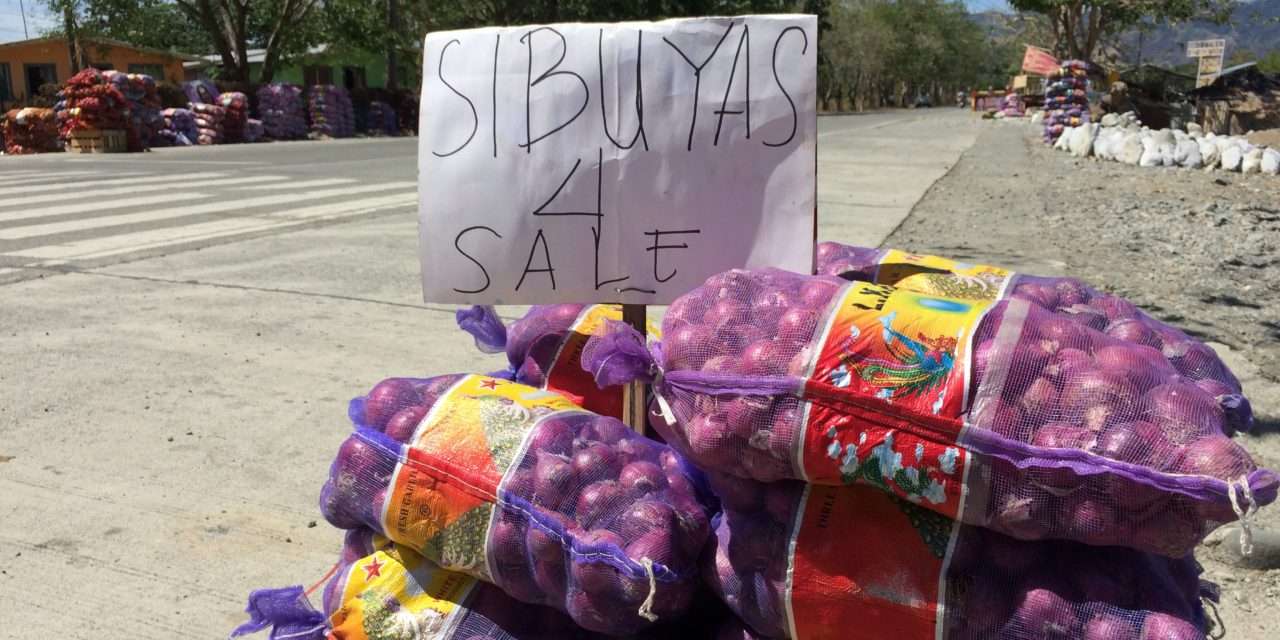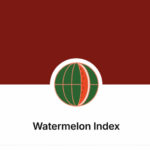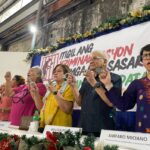Raphael Baladad
On March 25, 2019, a radio news report briefly mentioned a farmer committing suicide after farm-gate prices of onions suddenly fell to ₱15.00 per kilo.[i] Incidents of farmer suicide are extremely rare in the Philippines compared to countries like India, where more than 300,000 farmers have taken their lives over the past 20 years due to worsening economic and climate conditions. The news of this onion farmer’s lonely death might have reached only a few ears, but it signals how neoliberal policies have finally gnawed away the perseverance of the rural poor.
Amid the inflation crisis in August last year, the Department of Agriculture (DA) pushed for the lowering of onion import tariffs to stabilize market prices—a move that eventually cost the harvest of small onion farmers this month, particularly in the Province of Nueva Ecija, which accounts for 54%[ii] of the country’s total production. With the over-supply of onions, farm-gate prices plummet, but market retail prices remain at ₱60.00. Manuel Del Rosario, a peasant leader and also onion farmer from the Pambansang Katipunan ng mga Samahan sa Kanayunan (National Assembly of Rural Organizations), says this was caused by cartels who control storage facilities, who are widely known to bar farmers from storing crops at the onset of lean seasons, forcing them to sell their crops at a lower price instead of risking spoilage. The very same cartels, Del Rosario adds, “collaborate with importers to strangle supply of vegetables and fruits during abundant months and bloat prices.”
Del Rosario recounts the harrowing impacts of the recent onion price-drop to farming communities in Nueva Ecija and Tarlac. Farmers were forced to harvest bulbs early in an attempt to regain losses in capital and to secure debt payments for middlemen. Some already sold or pawned what little personal property they had left, in the hopes of raising enough money to survive until the next cropping season. Others finally decided not to prepare for the next season, resigning themselves to the reality that they need to find income through other means. A pressured DA then proposed a ₱300 million loan facility to ease the burdens of onion farmers, suspended onion imports, and prompted an investigation into the cartels. This however, was another “knee-jerk and palliative response” according to Del Rosario, in “an attempt to cover up the government’s lack of initiative or even capacity to dismantle the control of traders/middlemen in agriculture production and markets.”
Though emergency importation has been a convenient solution for Duterte’s economic managers in addressing sudden scarcities in supply, it sidelines the need to scale gaps in agriculture policy and program implementation—in order to attain better, but harder to reach outcomes such as food self-sufficiency.
Alongside the rice crisis (see article The Price of Taming Inflation), last year was also marked by a shortage in the supply of popular species of fish, with the government also being quick in resorting to importation to appease consumer demand. Similar to the onion price-drop, this response from government reaped criticisms—though now for its absurdity, since the Philippines is an archipelago and was once a top contributor to the world’s total fish supply. But ultimately, it underscores the government’s lack of support for artisanal fisherfolk and communities that depend on the country’s marine resources. According to Pablo Rosales[iii] of Pangisda (Progressive Alliance of Fisherfolks), the struggle of fisherfolk is punctuated by “decades of foreign intrusion of local fishing grounds and destructive fishing practices employed by commercial fishing vessels.” In the past three years, Duterte’s vague diplomatic concessions with China exacerbated the living conditions of fisherfolk who source their livelihoods in the West Philippine Sea (WPS). While Chinese fishing vessels operate with impunity, Duterte downplays incidences of harassment from Chinese coast guards.[iv] Duterte’s now meek[v] stance in defending the nation’s sovereign rights in the WPS has greatly disempowered fisherfolk, with some now opting to find new fishing routes instead of risking life and limb for a measly catch. According to Rosales, “the overfishing of Chinese vessels eventually led to the decimation of fish supply in the country,” hence last year’s shortage. “But what we find more outrageous,” Rosales adds, “is the irony of the government’s plan to import fish from China”.
Marinel Cueno, a community leader from the League of Urban Poor for Action and Manila Bay Para sa Tao (Manila Bay for the People) movement, paints a different picture of the fisherfolk’s struggle. Fishing communities in the Manila Bay area are now threatened by possible evictions, now that more than “26,000 hectares of fishing grounds have been eyed for reclamation projects” (see article: Cleansing the Augean Stables). Fishing communities in the Manila Bay area, Cueno says, “are no strangers to poverty, brought by decades of being sidelined by a development agenda that centers on expanding commercial and industrial areas in the Metro.” Cueno recounts the story of a fisherman in Barangay Parola, who begged off from attending a meeting after catching only a half kilo of asuhos[vi] in his morning fishing trip. Selling it for P60.00, the tired fisherman docked his makeshift raft to find extra work at the nearby pier, or to scavenge for fish scraps at the local market. “To most fishers in the area,” Cueno narrates, “selling their entire catch is better than taking a portion of it to feed their families. Instead, they survive on instant noodles and rice.” “It is an ironic situation; when those who feed the nation are the ones who are poor and hungry,” Cueno expresses.
Extreme poverty brought about by the stagnation of rural economies has resulted in the disenchantment of younger generations in engaging with rural professions such farming and fishing. In the last five years, employment in agriculture has seen a steady decline: from 32.2% in 2013 to 25.4% in 2018.[vii] The average age of Filipino farmers is 57; according to the DA itself, the country might reach a critical shortage of farmers in the next 15 years.[viii] “When subsistence has become the norm in rural areas, the only option is to escape by looking to other professions, or sources of income. It is saddening reality, when being a farmer or a fisherfolk is equated to being poor,” Del Rosario laments.
A time for alternatives
“Filipinos need to push for a change in regimes,” says Romeo Royandoyan of Centro Saka, or the Philippine Center for Rural Development Studies. Royandoyan describes how the shortage in onion and fish supplies will have similar outcomes on the country’s staple with the passage of the Rice Tarrification Law last year. “With government food policies shifting away from self-sufficiency, we will be at the mercy of an international food market—that has become increasingly unstable due to worsening climate conditions.” “Once a global food crisis hits, which is likely and not unprecedented, it will be difficult for the country to turn back to local production—as the number of small food producers have already dwindled,” says Royandoyan.
The countryside is already in “crisis” and it needs to be “redefined” Royandoyan stressed, “especially now under Duterte where the neoliberal economic model we spent the last five decades resisting has reached the maturity of its expression in economic and governance policies.” Now that the public is more aware of the impacts of such policies on farmers and fishers, the government responds with palliative measures designed ease their agendas in without meeting resistance from the people. “Capacity building and support services alone will not uplift the living conditions in the countryside, since its does not change market systems that ultimately cause poverty in rural areas,” Royandoyan adds.
Under the current state of things, there will be no systemic responses to address the ills of the countryside, since Duterte has already eroded the spaces where reforms can be demanded by the people. In a setting where the government and its policies do not support the survival of small food producers, it is up to social movements to cover lost ground. The problem however, Royandoyan stressed, “is that we are too fragmented and spread too thin around too many issues to generate enough pressure in challenging dominant regimes.”
“We need to regroup and go back to the grassroots,” according to Daryl Leyesa of the Pambansang Koalisyon ng mga Kababaihan sa Kanayuan (National Rural Women’s Coalition), “especially at this time when government policy and corporate capital have aligned against the survival of small food producers.” Though policy and program engagements are equally important according to Leyesa, “we need to push for alternatives as an expression of resistance to prevailing models of development.” Alternatives, such as the adoption of ecological, social and cultural rights, gender mainstreaming, social protection and other rights based approaches—as frameworks in engaging the government for reforms or in grassroots interventions—enable us to “reclaim the development discourse back to communities,” Leyesa adds.
Alternatives can also be systems in food production, such as Agroecology, organic farming, and other sustainable methods, which are effective in countering the overdependency of small farmers on chemical farm inputs.” says Leyesa. Agroecology promotes the return of food production methods to traditional, cultural, and indigenous practices; reduces the vulnerabilities of small farmers to climate change; and enables better health and nutrition outcomes for rural households.
Building Solidarity Economies in rural areas enables the resistance to competitiveness, market-based, and private investment-led models of development. Strong cooperatives and community markets aid in dismantling monopolies and reclaim the control of food resources from profiteering middlemen and cartels. The recent oversupply of onions prompted Solidarity Markets, where people link producers through social media directly to buyers or groups of consumers in urban areas.
Community Seed Banking counters the prevalence of genetically modified and hybrid seed varieties that undermine the autonomy of farmers from corporate interests in food production. It also enables farmers to prepare for erratic weather conditions such as floods and droughts, and decreases the likelihood of getting indebted to middlemen and grain brokers. According to Del Rosario, “practices in seed banking can be adopted in building community/cooperative based storage facilities for agriculture produce, to improve the income security of farmers in leaner months.”
Del Rosario also suggests a return to the Bayanihan system, a set of traditional/cultural norms in farmwork to resist prevalent share tenancy schemes that favor middlemen and other profiteers. Bayanihan, Del Rosario adds, can also be adopted by communities to “absorb mechanization efforts from the government, which also largely fell in the hands of middlemen.” Communities can be mobilized to make “idle lands productive, and as a form of resistance to land-use conversions.”
Community-led Rehabilitation of Aquatic Resources is an alternative to the government’s slow response in protecting municipal waters from overfishing by commercial vessels. Rosales say that “It can also harness the energies of community fishers towards defending municipal water from destructive and unsustainable fishing methods”. Community-led rehabilitation can be an exercise of occupation, to resist commercial reclamation and displacement of fishing communities.
What’s at stake in the 2019 Midterm Elections
Despite the shrinking spaces where people’s movements can demand reform under the Duterte administration, movements continue to push for appropriate policy and budget responses in addressing crises on food. Equally important is the demand for preventive government responses through programs that uplift small food producers from poverty, as against the expansion of profiteering and corporate interests on food, land, and water resources. The survival of the countryside under Duterte’s neoliberal economy also rests on alternatives and promoting community expressions of resistance. Above all, raising the individual dignities of small food producers should be a resounding call, in exacting accountability for the failures of government to address the perennial problems in the countryside.
As election season nears, candidates ride tirelessly on the issues of food, poverty, and hunger, along with the solutions they promise to deliver. This, however, shifts the discourse on food away from small food producers and their survival in a policy and program environment that failed to promote their rights. More than personalities, what we need to scrutinize are positions or approaches of candidates in issues affecting the survival of the countryside. Candidates who:
- Support the full and effective implementation of the Comprehensive Agrarian Reform Program, prioritizing the distribution of privately owned lands, along with the delivery of appropriate support services for farmer beneficiaries.
- Support the passage of the National Land Use Act, to protect agricultural lands from corporate land-use conversions and land grabbing that threaten to displace farming, fishers, and forest dwelling communities.
- Resist neoliberal policies, such as the rice tariffication law, that favor importation as the only solution for “food security” despite its impacts on the survival of small community producers.
- Are against policies that enable privatization of irrigation systems and other waterways that support farming communities, along with those who are against corporate/industry-led agricultural modernization, capacity enhancement programs, and market assistance.
- Support the immediate passage of the Coco Levy Bill, along with ensuring its disbursement to coconut farmers is protected from corporate and political interests.
- Push for the protection of municipal waters against commercial interests and support community-centered rehabilitation efforts.
- Oppose the commercially driven reclamations in Manila Bay that threatening to displace communities in the name of enhancing business investment.
- Support policies or programs that directly uplift the individual rights and dignities of food producers, along with those who support programs that promote food production as a viable profession for the youth.#
__________________
[i] Falling to ₱9.00 in some areas in Mindoro, according to various reports.
[ii] 54% of total production
[iii] Rosales, in Forum organized by Focus on the Global South: Defending Food Sovereignty: Confronting the Challenges of Small Food Providers in the Philippines, 15 October 2019.
[iv] Ranada, P. Duterte: China taking of PH fisherman’s catch ‘not outright seizure’. Rappler. Accessed 29 MArch 2019: https://www.rappler.com/nation/205225-duterte-china-filipino-fishermen-catch-panatag-shoal-not-outright-seizure
[v] Batino,C., Calonzo, A. Duterte Says China’s Xi Won’t Allow His Removal From Office. Bloomberg. Accessed 19 March 2019: https://www.bloomberg.com/news/articles/2018-05-16/duterte-says-china-s-xi-has-his-back-to-help-him-stay-in-power
[vi] Silver branded whiting, a common type of fish in the Philippines.
[vii] Philippine Statistics Authority: Selected on Statistics on Agriculture, 2018.
[viii] Quoted from the Explanatory Note of HB 5536. Philippine Congress. Accessed 19 March 2019: http://www.congress.gov.ph/legisdocs/basic_17/HB05336.pdf









